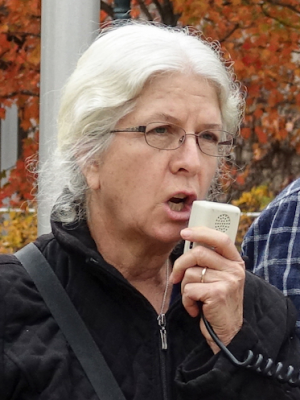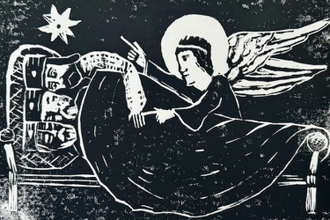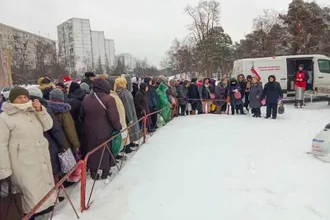Exclusive interview with Martha Hennessy, granddaughter of Dorothy Day

Martha Hennessy. WIki Image
Martha Hennessy is a prominent US peace activist, Catholic Worker and granddaughter of Dorothy Day. Here she discusses the importance of the movement today ahead of her talk at the London Catholic Worker, this Saturday at 2-7pm, as part of the 90th anniversary gathering.
So, 90 years on from its founding, what is the message that the Catholic Worker movement has for today?
I believe the message remains the same. We work with the Catholic social teachings, providing the works of mercy, houses of hospitality. Also, the parts of Peter's programme. You know, agronomic universities, where scholars can come to work and workers can become scholars and study. A method of breaking down the class structure of the United States. So, I think that the mission is always the same. The gospel teachings of Christ. How do we work as disciples of Christ in the 21st century.
Immense technological changes have occurred, especially since the 1930s, but Dorothy and Peter spoke to the immediate needs of the person in front of you. Dorothy was very practical. Peter had the theoretical underpinnings and the gospel teachings. You know what I always remind myself of? To keep it very simple: to love God with all your mind, heart and soul, and to love your neighbour as yourself. That's the basic Christian teaching. And so, we do hope that the Catholic Worker continues to display and further that message in the movement.
If your grandmother, Dorothy Day, and her co-founder, Peter Maurin were to see the movement today, what do you think would strike them? What would make them be joyous? What would they want to call us back to?
I think they would be very grateful to see the soup lines. You know, feeding the people who can't fit into the houses. The soup lines, I think are very important. And also the hospitality that is provided in the houses, you know, to the best of everyone's abilities. I mean, they would recognise the scene in the kitchen of cooking a big pot of soup to be distributed. So, I think that that hospitality aspect is still quite obvious and intact.
I think they might wonder what's going on with some of the houses that may not be doing in-house hospitality and speaking truth to power. Though there are houses and communities who definitely hold on to that message. And, you know, we have to evolve. Things change over the decades and over the generations.
You have spoken before about how your peace work with Kings Bay Ploughshares - being imprisoned for entering a US nuclear military base - differed from Dorothy's more restricted view of direct action. Is there something about today which you think requires us to act differently?
She recognised the horror of the bomb. She witnessed it in her lifetime, unlike us. But I think the two principles that she had concerns about with her dear friends, Phil and Dan Berrigan, were the question of secrecy and destruction of property. So, I had to discern in my own heart and mind what that meant. This question of the nuclear weapons being right in front of us, hidden in plain sight. The secrecy behind the whole program just was unbearable to me. And Dan Berrigan spoke to the question of property. What is proper to the common good? Nuclear weapons are not proper to the common good. So that answered my question of the so-called destruction of property. And, you know, for our situation with the US military, you're not going to get onto those bases if you
announce what you're that you want to go on to those bases. So that was it. What will resistance to nuclear weapons require? It may look different in my grandchildren's time. We're praying to God that they'll be abolished within my lifetime.
Catholic Worker communities are very beautiful but also very challenging places to be. What was it like to grow up within the Catholic Worker movement?
The Catholic Worker movement is not an NGO. It's not an agency. It's a family. And I certainly grew up with the definition of family being beyond biological. So, I think it's very important to keep that spirit within the houses of making people feel comfortable and welcomed and that you're willing to share, you know, all that you have with them, including yourself and your time and your space.
A real challenge is growing up in a large city. Tamar, my mother, loved the countryside. And so her first two children were born at the Eastern Catholic Worker Farm, and the next two were born on their own farm. And then my sister was born on the Peter Maurin farm. So we had a variety of experiences of being a family unit within the community, but also having our own space. But, you know, there are issues. There's a lot of mental illness in the Catholic Worker houses due to the situation of those who are left behind, who fall through the cracks. But my mother had wonderful memories of her childhood. Just the warmth, the camaraderie, the family style that Dorothy managed to evoke. For everyone. Now, how beautiful is that compared to state institutional approaches.
When you grew up, you moved away for a time from both the Catholic faith and the Worker movement. How did you find yourself journeying back to faith and back to the Catholic Worker movement?
It's hard to explain conversions. Conversions are mysterious things. My father left the family when I was six. My mother kind of left the church. She had all kinds of questions of how the Church treated women and children. My grandmother was heartbroken to see us just drift away from the Church. But later I just found myself returning. I really can't explain it. Dorothy was inducted into the National Women's Hall of Fame in 2002, and I had to give a little acceptance speech, and my life changed drastically after that. I was just hit over the head. I was living in Vermont, working as an occupational therapist, raising my children, getting them through college, living a normal life, paying my war taxes. And then I had to give this little speech and I realised what this legacy meant... the kind of soapbox I was given and how I should start using it. So that was kind of the beginning.
Later I struck up a correspondence with Daniel Berrigan, and he really did help me in very mysterious ways to return to fundamental questions. What does your baptism mean to you? What are you going to do with this? The answer was: you're a Catholic and you're within the Catholic Worker. Still, I was totally terrified of going back to Mary's house. I hadn't set foot in the house for 24 years after Granny's funeral, but now I can see that all of these little seeds were planted to bring me back somehow.
Martha will speak this Saturday with Anna Blackman, a researcher on the UK Catholic Worker movement, at the London Catholic Worker (49 Mattison Road, London, N41BG). To find out more about this 90th anniversary gathering, please go to the Eventbrite page: www.eventbrite.co.uk/e/london-catholic-worker-90th-anniversary-gathering-with-martha- hennessy-tickets-769607255017
See also Open Day at London Catholic worker - www.indcatholicnews.com/news/48715


















